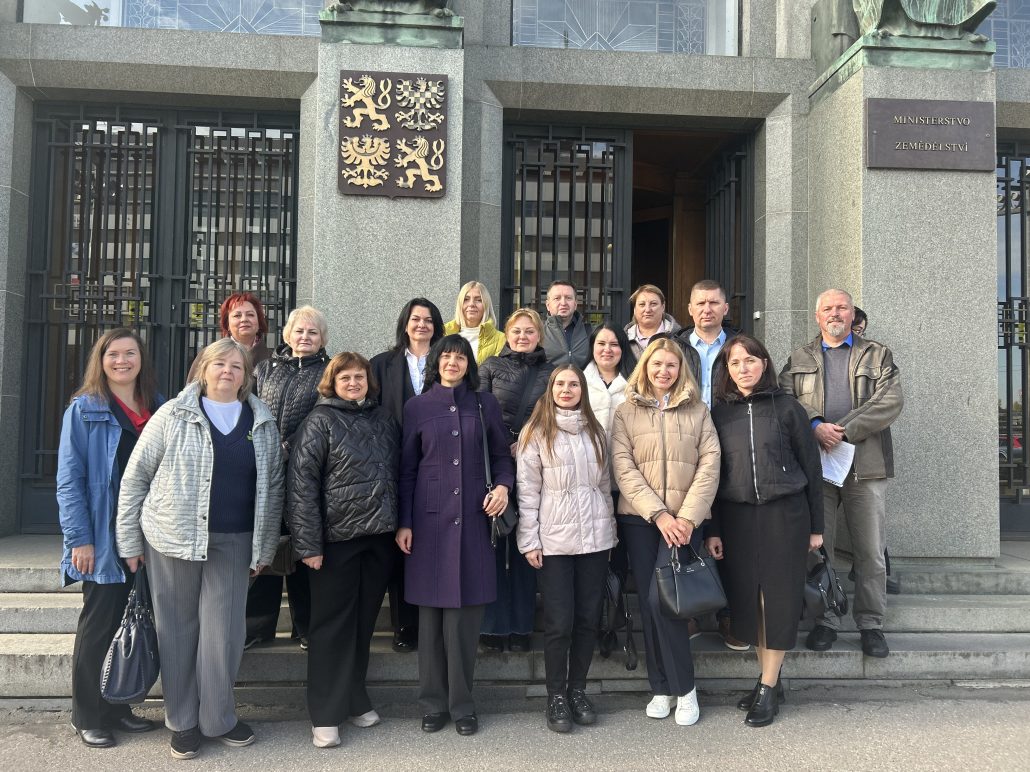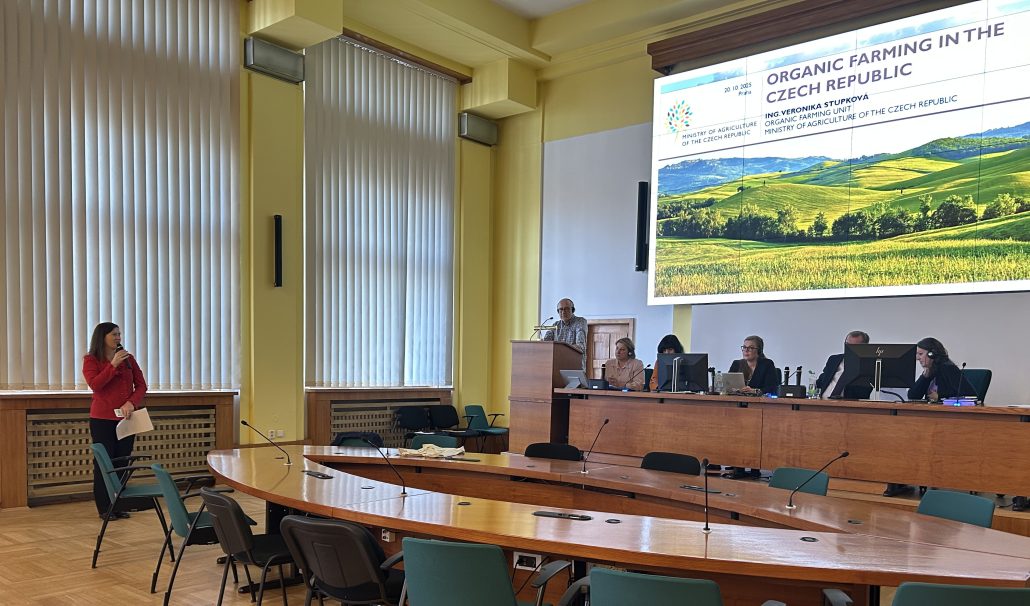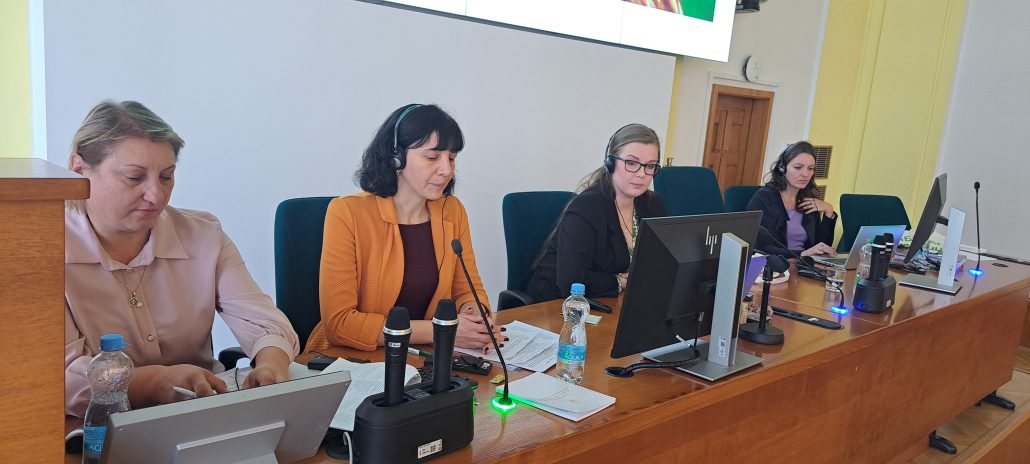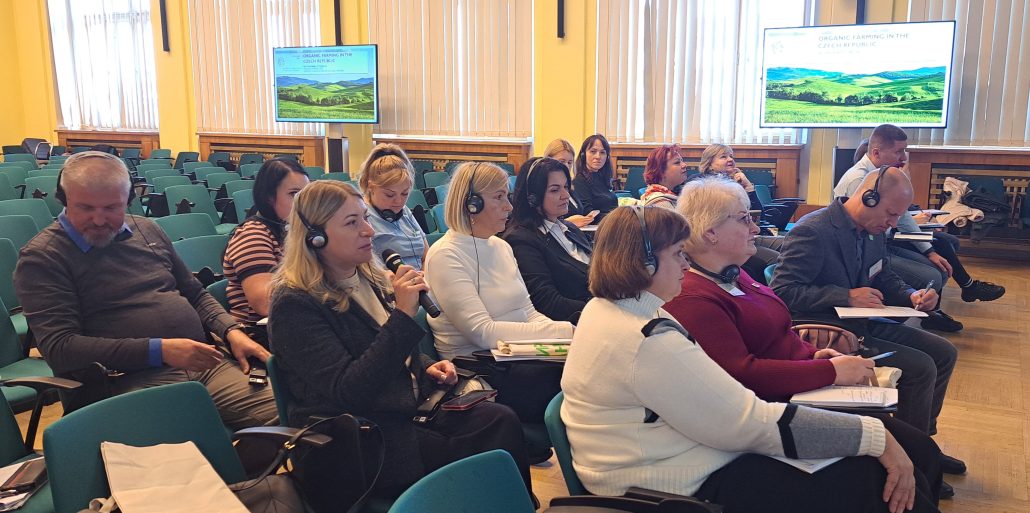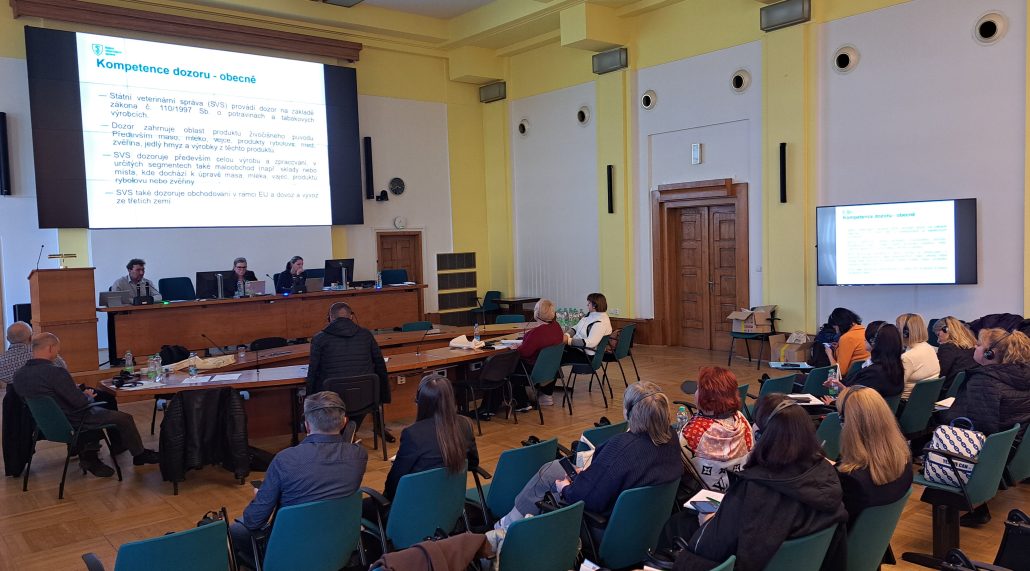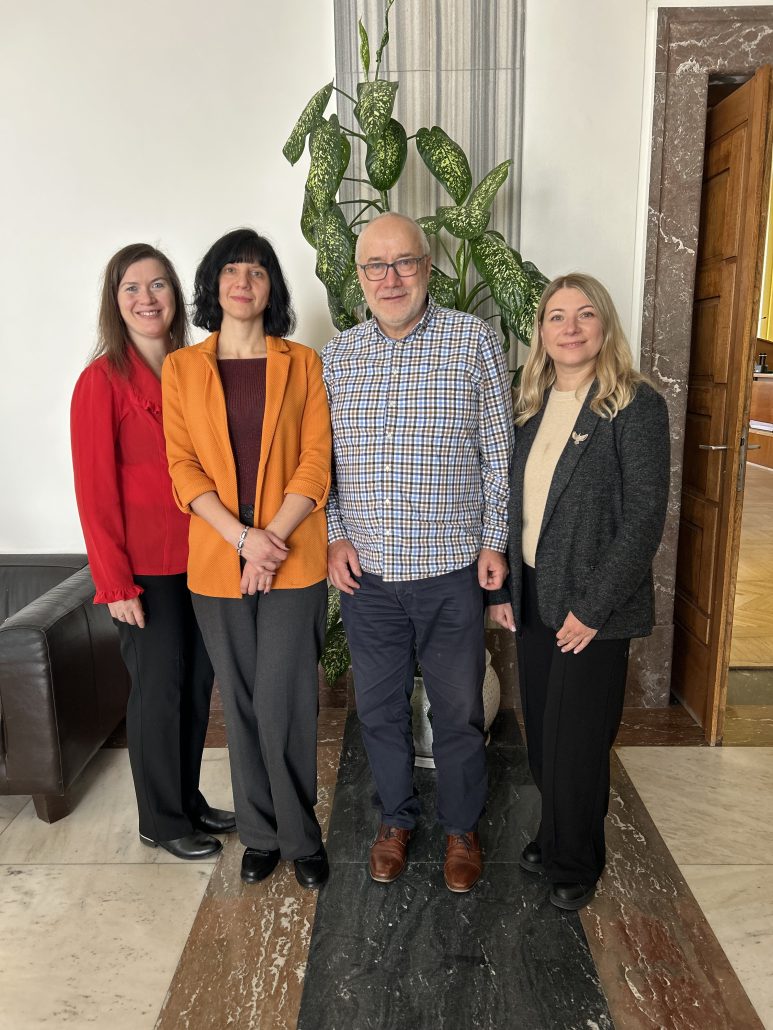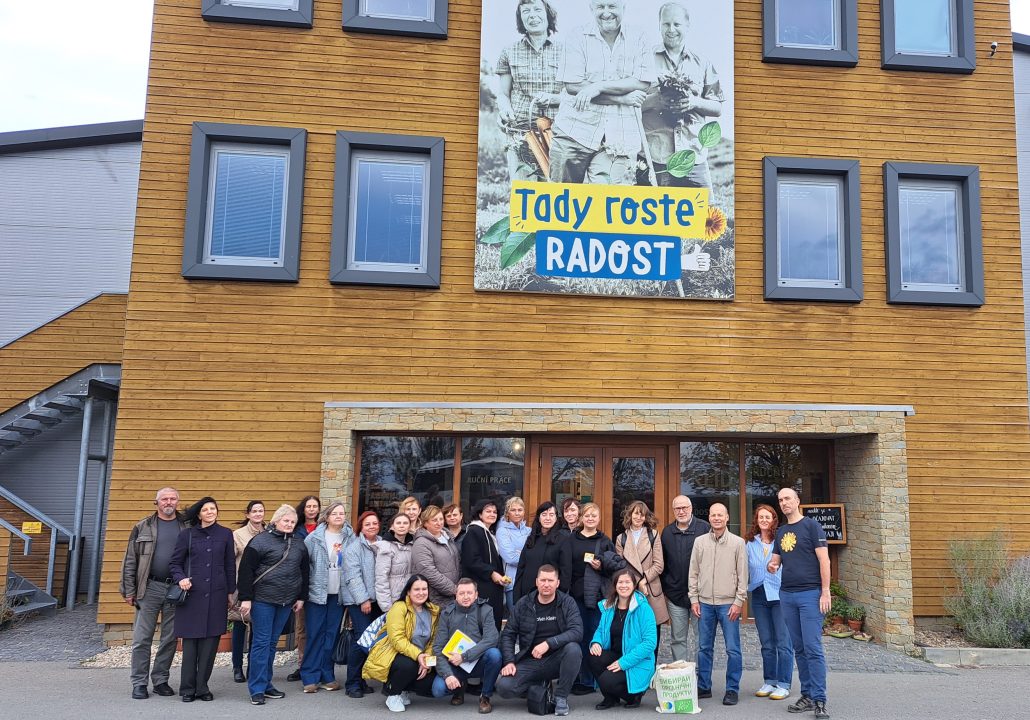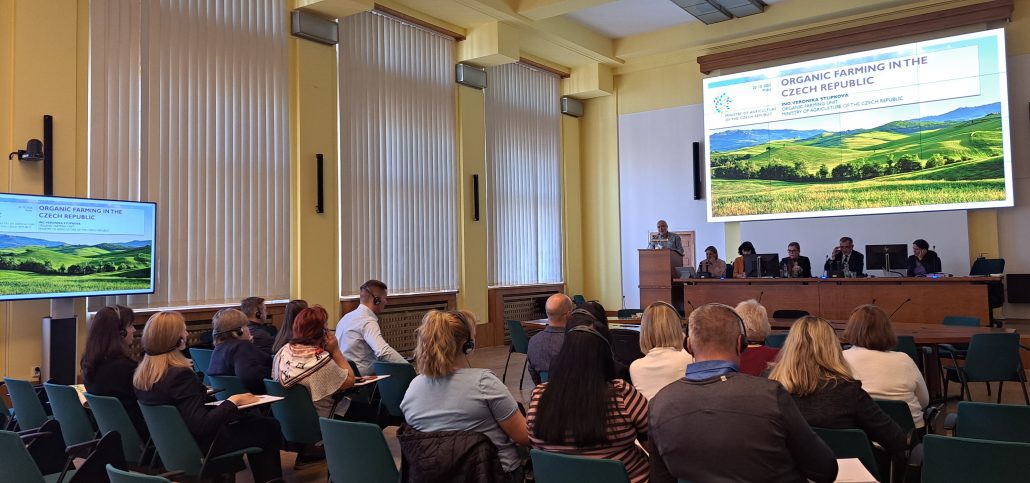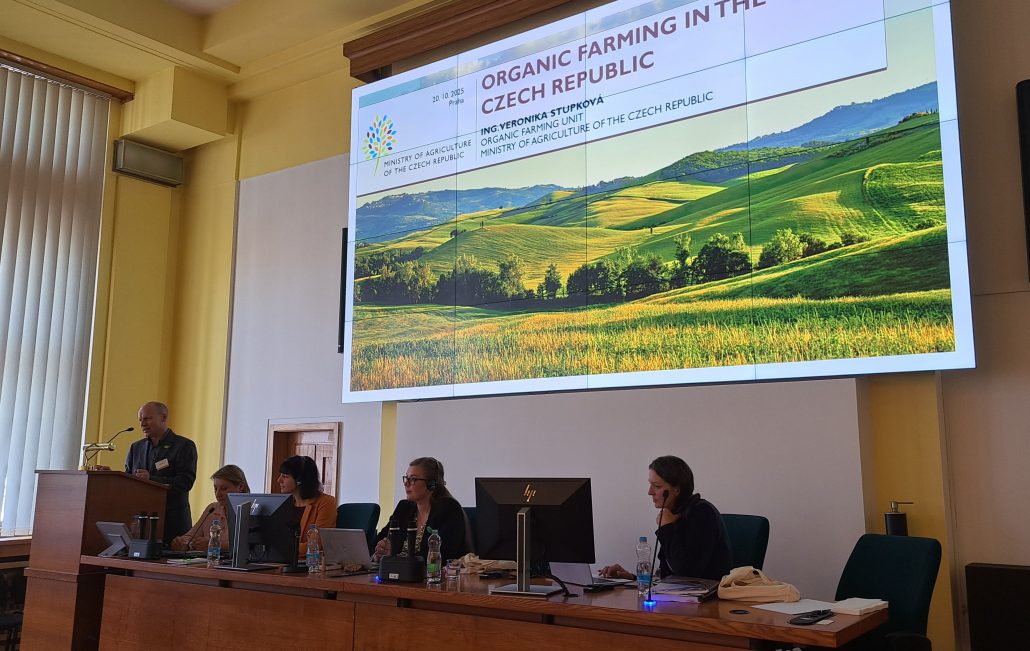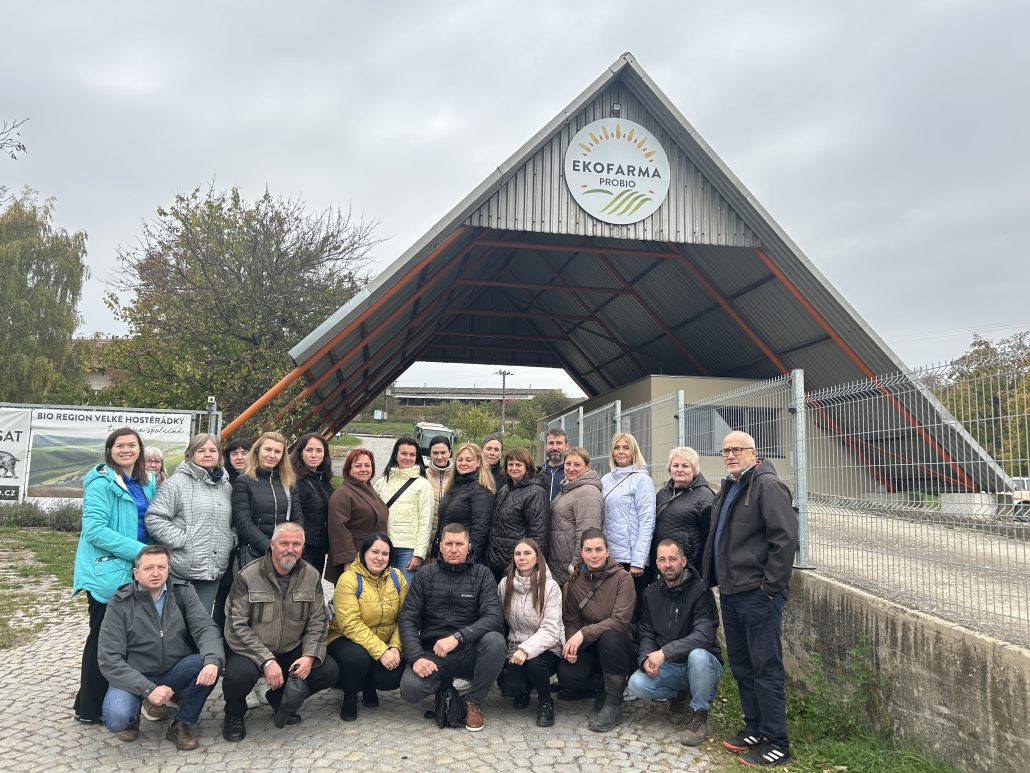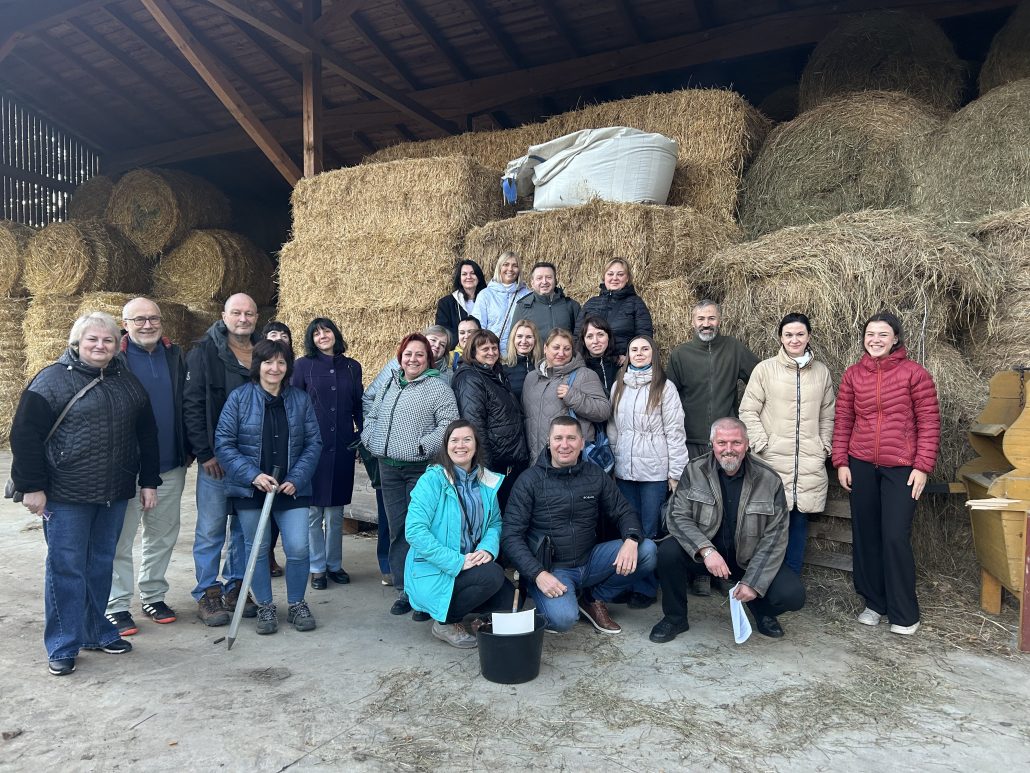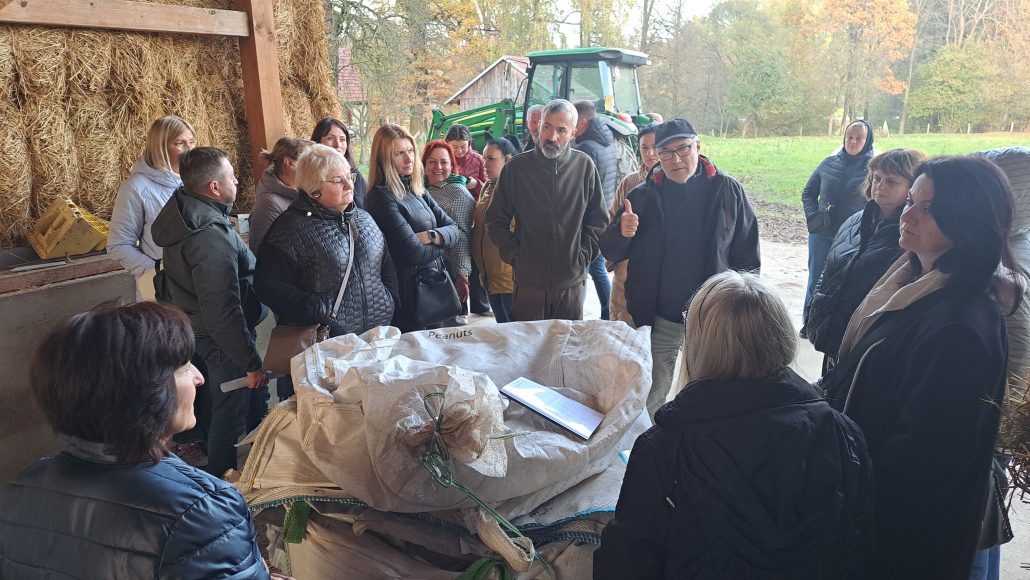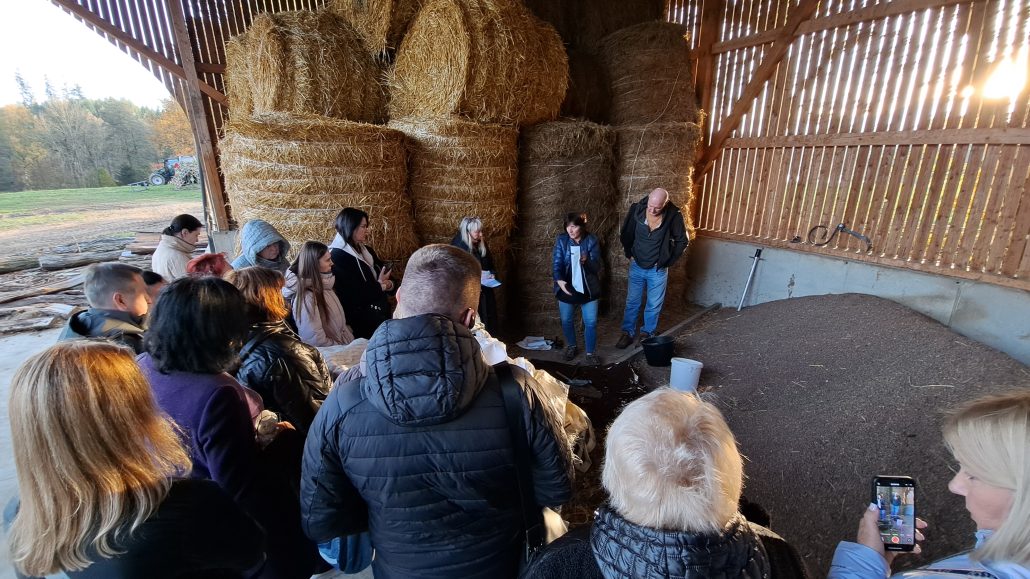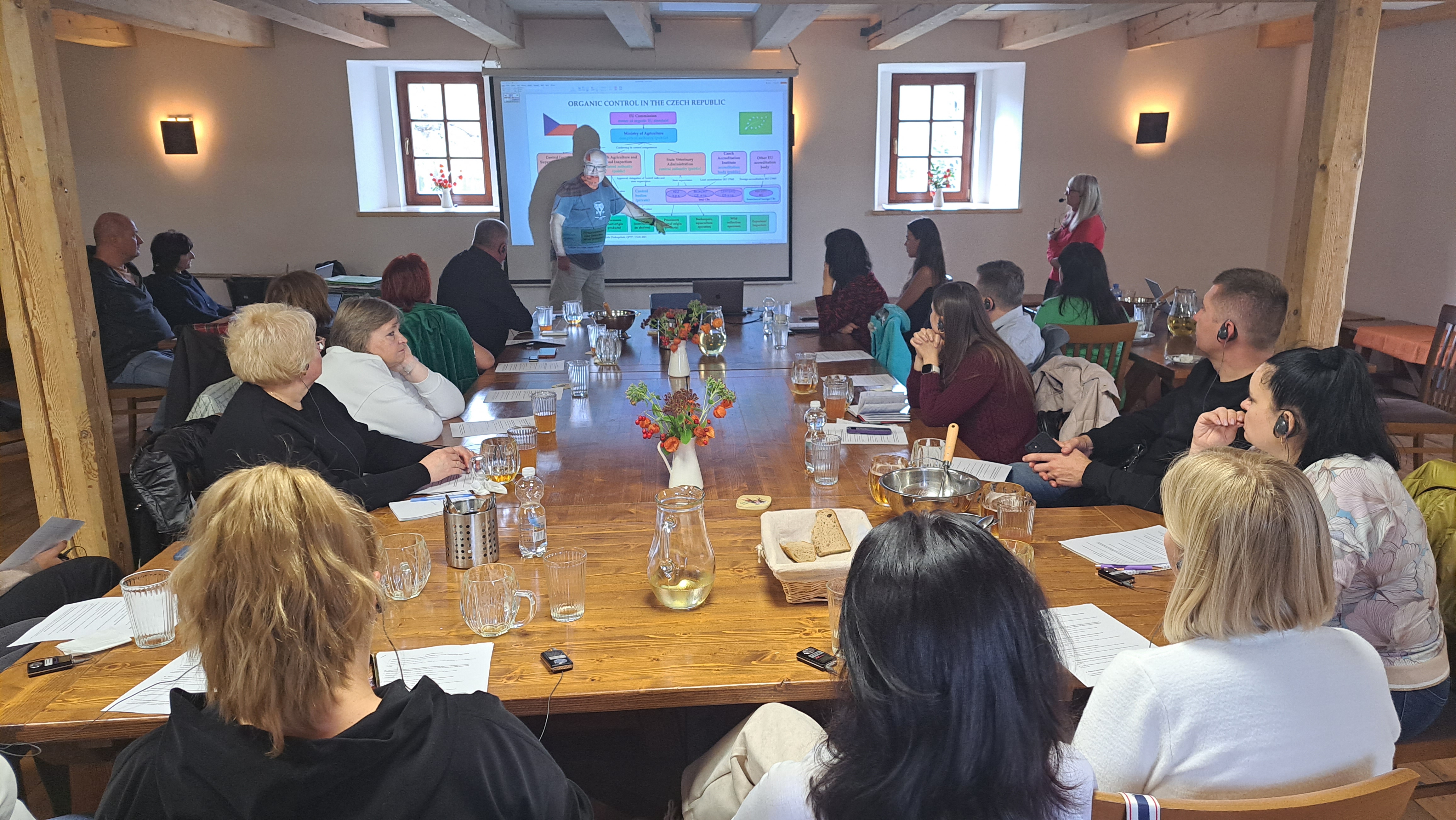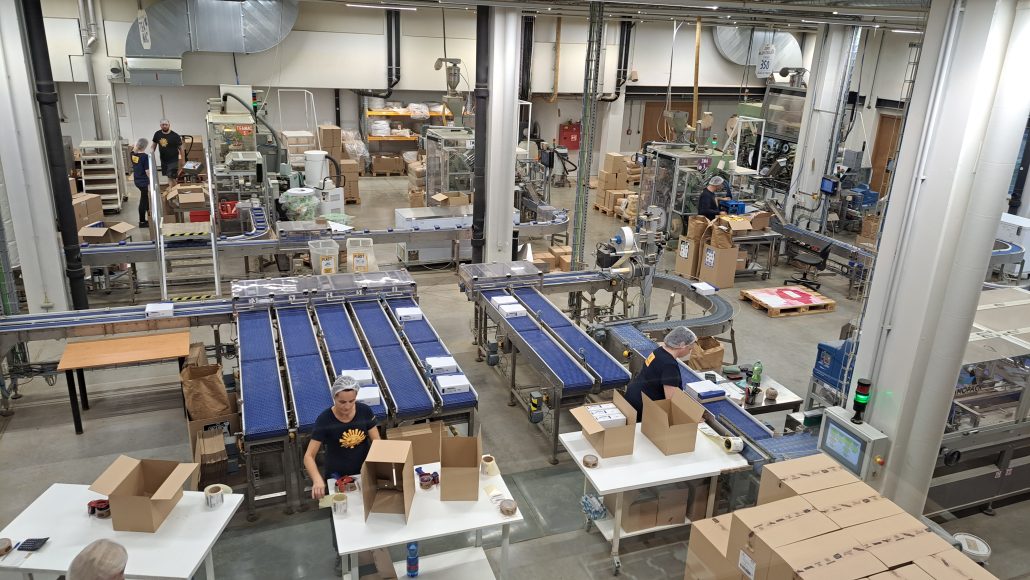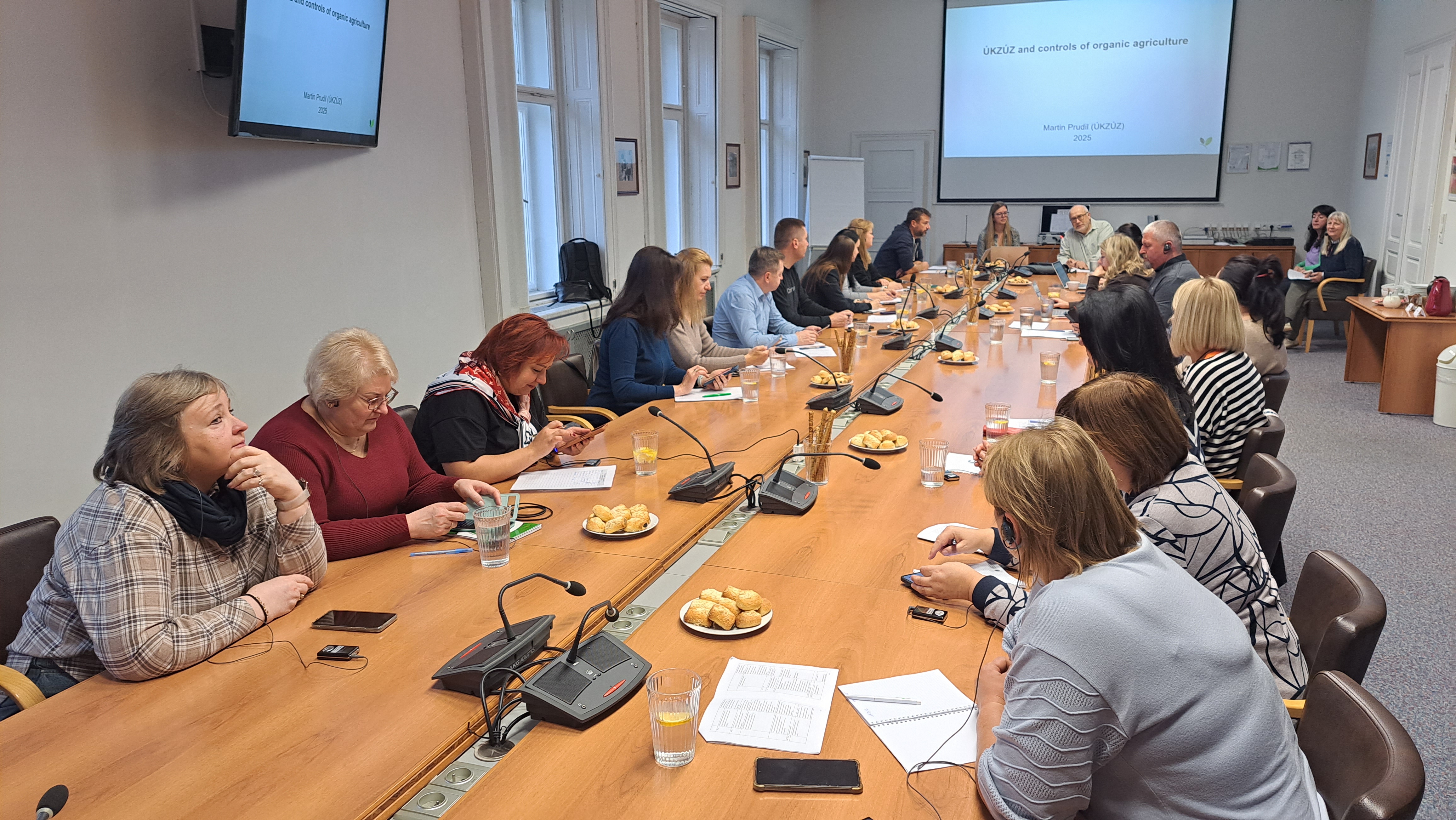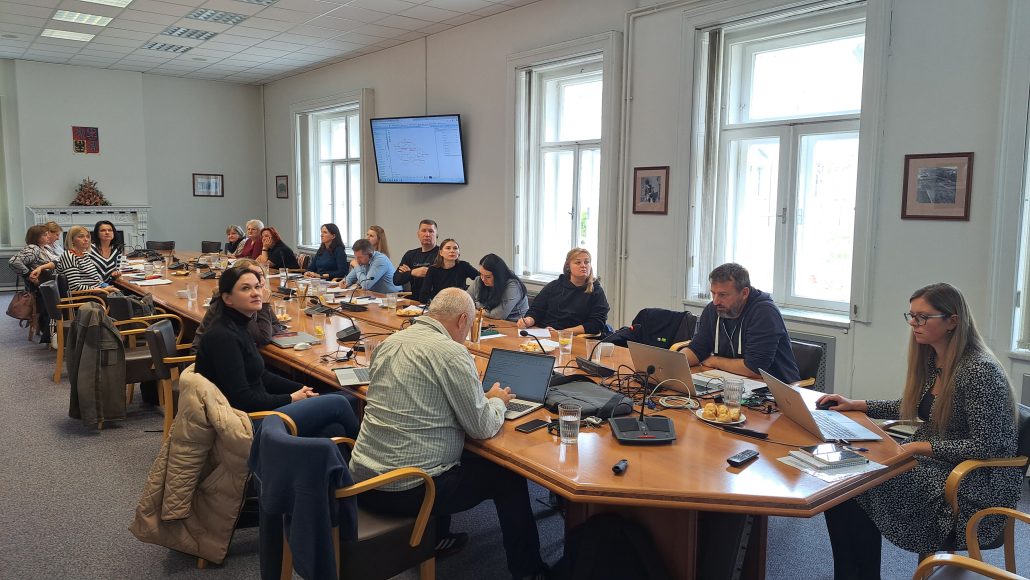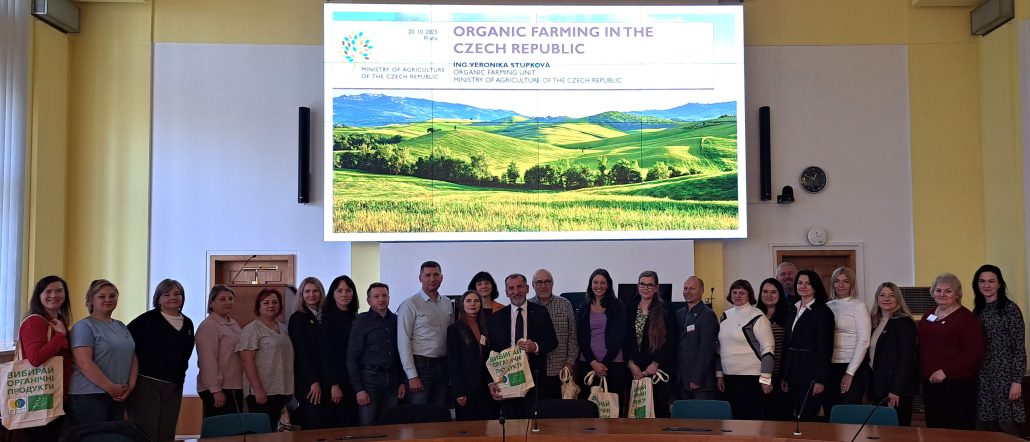
From 19 to 24 October 2025, a study tour to the Czech Republic took place, featuring practical training on state control in the organic sector. The tour was organised at the request of the Ministry of Economy, Environment and Agriculture of Ukraine and the State Service of Ukraine for Food Safety and Consumer Protection (SSUFSCP).
The tour was organised with the support of Switzerland the framework of the Swiss-Ukrainian Programme “Higher Value Added Trade from the Organic and Dairy Sector in Ukraine” (QFTP) in cooperation with the Ministry of Agriculture of the Czech Republic, the Central Institute for Supervising and Testing in Agriculture (UKZUZ), the State Veterinary Administration of the Czech Republic (SVS), the Czech Agriculture and Food Inspection Authority (SZPI), and the Bioinstitut NGO (Czech Republic).
As organic farming remains one of the priorities of Ukraine’s agri-food policy, sustainable development and European integration, the aim of the study tour was to enhance the professional competencies of Ukrainian state inspectors and specialists from state bodies, develop their potential for the effective implementation of state control in the organic sector in accordance with EU regulations, and strengthen cooperation between Ukraine and the Czech Republic.
The Czech Republic was chosen for the study tour because organic legislation in this country has been fully implemented and is functioning effectively, ensuring a high level of state control. For Ukraine, which is actively developing its organic sector and aligning legislation wit the EU requirements, learning from the Czech experience is invaluable.
For its part, Ukraine has already made significant steps in establishing organic legislation: it has fully implemented legislation in the field of organic production, circulation, and labelling of organic products (Law of Ukraine “On the Main Principles and Requirements for Organic Production, Circulation, and Labelling of Organic Products”), launched two state registers: for certification bodies and organic market operators, and has prepared a new draft law “On State Regulation of Organic Production, Circulation, and Labelling of Organic Products”, aligned with Regulation (EU) 2018/848. This draft law was adopted in the first reading by the Verkhovna Rada of Ukraine on 18 June 2025 and is being prepared for the second reading. The full adoption of this draft law will be an important step, as the harmonisation of Ukraine’s legislation on organic production with the relevant EU regulation is a key element of Ukraine’s European integration process.
Ukrainian authorities continue to work actively in three key areas:
- implementing current Ukrainian legislation on organic production and the circulation of organic products;
- aligning Ukrainian organic legislation with the current EU organic regulation;
- developing political dialogue to support organic production, trade, and raising awareness of organic products.
At the same time, due to the moratorium (ban) on business inspections by state authorities during the state of martial law in Ukraine, state control in the organic sector is not yet fully operational. However, it is important to complete training before the moratorium ends to be ready to fulfil responsibilities under the legislation.
In accordance with Ukraine’s organic legislation, state control functions in the field of organic production, circulation and labelling of organic products are assigned to the State Service of Ukraine for Food Safety and Consumer Protection. Therefore, 17 representatives of state authorities took part in the study tour, including: 13 state inspectors of the regional offices of the State Service of Ukraine on Food Safety and Consumer Protection; 1 person responsible for the organic topic in the State Service of Ukraine on Food Safety and Consumer Protection central office; 1 person responsible for state official control from the headquarters of the State Service of Ukraine on Food Safety and Consumer Protection; responsible staff for Ukrainian organic legislation drafting, improvement and alignment with the EU relevant regulation of the Ministry of Economy, Environment and Agriculture of Ukraine; and a legislative expert and a lawmaking expert, consultant on legal issues, lawyer-developer of organic legislation in Ukraine.
On the first day of the tour, participants visited the Ministry of Agriculture of the Czech Republic, where they were welcomed by Miroslav Skřivánek, Deputy Minister of Agriculture of the Czech Republic. From the Ukrainian side, Maryna Kyslytska, Head of the Organic Department of the Ministry of Economy, Environment and Agriculture of Ukraine, gave a welcoming speech.
“First of all, I would like to thank the Czech authorities for the invitation and for supporting dialogue between our countries. We are grateful for their willingness to share their experience in how the organic sector functions in the Czech Republic, particularly in term of how the organic sector functions in the Czech Republic, particularly regarding the control and state supervision of organic production. Ukraine is currently building a system where the state is responsiblefor the integrity of organic products purchased by both Ukrainian consumers and international buyers (if the products are Ukrainian). For many years, organic production in Ukraine was controlled by certification bodies, which themselves were under the supervision of the European Commission or the authorities of relevant importing countries. We have a positive experience of cooperation between our ministries and control bodies, including training sessions in 2021 and online meetings during the process of drafting the law, which we hope will soon be adopted by the Verkhovna Rada of Ukraine (Ukrainian parliamnet),” said Maryna Kyslytska.
Olga Semenchuk, Deputy Director of the Department – Head of the Food Safety Directorate, Department of Food Safety and Veterinary Medicine of the State Service of Ukraine for Food Safety and Consumer Protection, spoke about the system of organic production control and the circulation of organic products in Ukraine.
During her presentation, Olga Semenchuk emphasised the importance of the study tour: “The State Service of Ukraine on Food Safety and Consumer Protection is responsible for state control over compliance by certification bodies and operators with legislation in organic production, circulation, and labelling of organic products. For our state inspectors from regional directorates, it was extremely important to familiarise themselves with the operations of similar state organisations in the Czech Republic, and to gain both theoretical and practical knowledge regarding control measures, approaches, inspection procedures, record-keeping, and responses to violations. That is why this study tour in the Czech Republic is of great significance for developing the capacity of the State Service of Ukraine on Food Safety and Consumer Protection and enhancing professional readiness for the full launch of state control in Ukraine’s organic sector. We are sincerely grateful to our Czech partners for such a valuable and engaging exchange of experience, and we look forward to the continuation of fruitful cooperation between Ukraine and the Czech Republic. We would like to express our gratitude to Switzerland for supporting our idea of a study tour to the Czech Republic with a practical training on state control in the organic sector, organised within the framework of the Swiss-Ukrainian Programme “Higher Value Added Trade from the Organic and Dairy Sector in Ukraine” (QFTP).”
Throughout the study tour, the meetings were coordinated and moderated by Jiri Urban, Director of the Crop Production Section, Central Institute for Supervising and Testing in Agriculture (UKZUZ), and Natalie Prokopchuk, Consultant for the Organic Component of the “Higher Value Added Trade from the Organic and Dairy Sector in Ukraine” (QFTP).
During the visit to the Ministry of Agriculture of the Czech Republic, participants familiarised themselves with Czech organic legislation, the structure of state institutions responsible for policy-making and control in this field, and their functions and responsibilities. They also organised received information on which powers are delegated to private certification bodies, which powers remain the exclusive responsibility of the state, and how state control over the export and import of organic products is organised.
The practical component included field visits to the following organic enterprises:
- Třeštický Mlýn – a mixed farm (360 ha), it has both crop production and animal husbandry (beef cattle without market milk production).
- Ecofarma PROBIO – a mixed farm (400 ha), it has both crop production and animal husbandry, cleaning, drying, separating of raw materials of plant origin.
- Sociální podnik Jasan – a mixed farm involved in crop production (vegetables, fruits, medicinal herbs including wild plants), small processing, and supplying boxes with organic products to consumers in Brno.
- SONNENTOR – a leading manufacturer of organic tea and spices in the Czech Republic.
- Vinařství Válka – an organic family winery, producer of organic grapes and wines.
Participants gained practical knowledge on organising inspections, record-keeping, sample collection, pesticide residue, conducting official investigations and applying sanctions.
The experience gained during the study tour will contribute to:
- Enhancing the effectiveness of state control in Ukraine’s organic sector;
- Strengthening the institutional capacity of state authorities;
- Harmonising Ukrainian organic legislation with EU legislation;
- Developing bilateral cooperation between Ukraine and the Czech Republic in organic production and circulation of organic products.
The study tour programme was intensive and professionally organised. Four Czech state organisations were engaged for training and experience exchange with the Ukrainian delegation (Ministry of Agriculture of the Czech Republic, the Central Institute for Supervising and Testing in Agriculture (UKZUZ), the State Veterinary Administration of the Czech Republic (SVS), the Czech Agriculture and Food Inspection Authority (SZPI), and private certification body (ABCERT)), and five of the aforementioned organic enterprises in the Czech Republic were visited.
All participants of the Ukrainian delegation expressed positive feedback on the study tour, discussed and agreed on next steps: jointly preparing a list of questions for Czech state authorities after reviewing the extensive information gathered during the trip; and continuing cooperation between Ukraine and the Czech Republic to align Ukrainian organic legislation with EU standards, which is a key driver of Ukraine’s European integration process.
The study tour to the Czech Republic, featuring practical training on state control in the organic sector, was organised at the request of the Ministry of Economy, Environment and Agriculture of Ukraine and the State Service of Ukraine for Food Safety and Consumer Protection, in cooperation with the Ministry of Agriculture of the Czech Republic, the Central Institute for Supervising and Testing in Agriculture (UKZUZ, the Chech Republic), State Veterinary Administration of the Czech Republic (SVS), the Czech Agriculture and Food Inspection Authority (SZPI), and the public benefit organisation “Bioinstitut” (Czech Republic).
This activity is implemented with Swiss support under the Swiss-Ukrainian Programme “Higher Value Added Trade from the Organic and Dairy Sector in Ukraine” (QFTP), implemented by the Research Institute of Organic Agriculture (FiBL, Switzerland) in partnership with SAFOSO AG (Switzerland).
Useful Links:
- Draft Law on the State Regulation of Organic Production, Circulation and Labelling of Organic Products
- Law of Ukraine “On Basic Principles and Requirements for Organic Production, Circulation and Labelling of Organic Products”
- Organic section at the website of the Ministry of Agrarian Policy and Food of Ukraine (due to the restructure of the Ministries in Ukraine organic agri-food topic will be under the Ministry of Economy, Environment and Agriculture of Ukraine)
- Organic Legislation of Ukraine overview (list of by-laws)
- The latest information about the organic sector in Ukraine
- Organic Map of Ukraine 2024 (EU, NOP) (area, operators, agricultural producers)
- Organic Map of Ukraine 2024 (Ukrainian law) (area, operators, agricultural producers)
- Ukraine became the third largest supplier of organic products to the EU in 2024, according to the EU Commission publication “EU imports of organic agri-food products, Key developments in 2024”, published in May 2025
For reference:
Organic agriculture remains one of the priorities of Ukraine’s agri-food policy, sustainable development, and European integration. Organic agriculture is included in various highly important Ukrainian documents thanks to political will, partnerships between the Ukrainian public and private sectors, commitment to organic farming, hard work of Ukrainian organic value chain actors, as well as the valuable support from international partners, including QFTP thanks to the strategic long-term cooperation between the Ukrainian and Swiss governments (Switzerland has supported organic market development in Ukraine since 2002).
- Strategy for the Development of Agriculture and Rural Areas in Ukraine for the period up to 2030 and the Operational Plan of measures for its implementation in 2025-2027, adopted by Cabinet of Ministers of Ukraine (CMU) Resolution #1163-р dated 15 November 2024, which states that the development of organic production is one of the priority areas for the medium-term “green transformation“ of agriculture and organic production can play an important role in climate change adaptation and mitigation, as well as biodiversity conservation.
- Ukraine’s Food Security Strategy for the period up to 2027, adopted by CMU Resolution #684-р dated 23 July 2024.
- Ukraine’s National Economic Strategy until 2030, adopted by CMU Resolution #179 dated 3 March 2021, with two organic indicators: Organic area increases up to 3% from total agricultural land, and Organic exports increase up to $1 billion by 2030.
- Sustainable Development Goals (SDG) with organic indicators contributing to Goal 15 “Protect and restore terrestrial ecosystems” (15.3 Restore degraded lands and soils through innovative technologies, Indicator 15.3.4 Area of land used for organic production, thousands of hectares) and to Goal 2 “End hunger, promote sustainable agriculture” (2.3. Ensure the development of sustainable food production systems that help maintain ecosystems and gradually improve the quality of land and soil, primarily through innovative technologies, Indicator 2.3.3 Share of agricultural land under organic production in the total area of agricultural land, %). It is included (and visualised through dashboards) on the State Statistics Service website, the data authority of Ukraine.
- Plan for the Ukraine Facility for 2024-2027, adopted in 2024, which is one of the key instruments for Ukraine’s recovery, reconstruction, and modernisation, potentially accelerating its EU accession path. The Ukrainian state envisions organic production growth as a key component of climate-smart agriculture and as a priority sector for investments.
